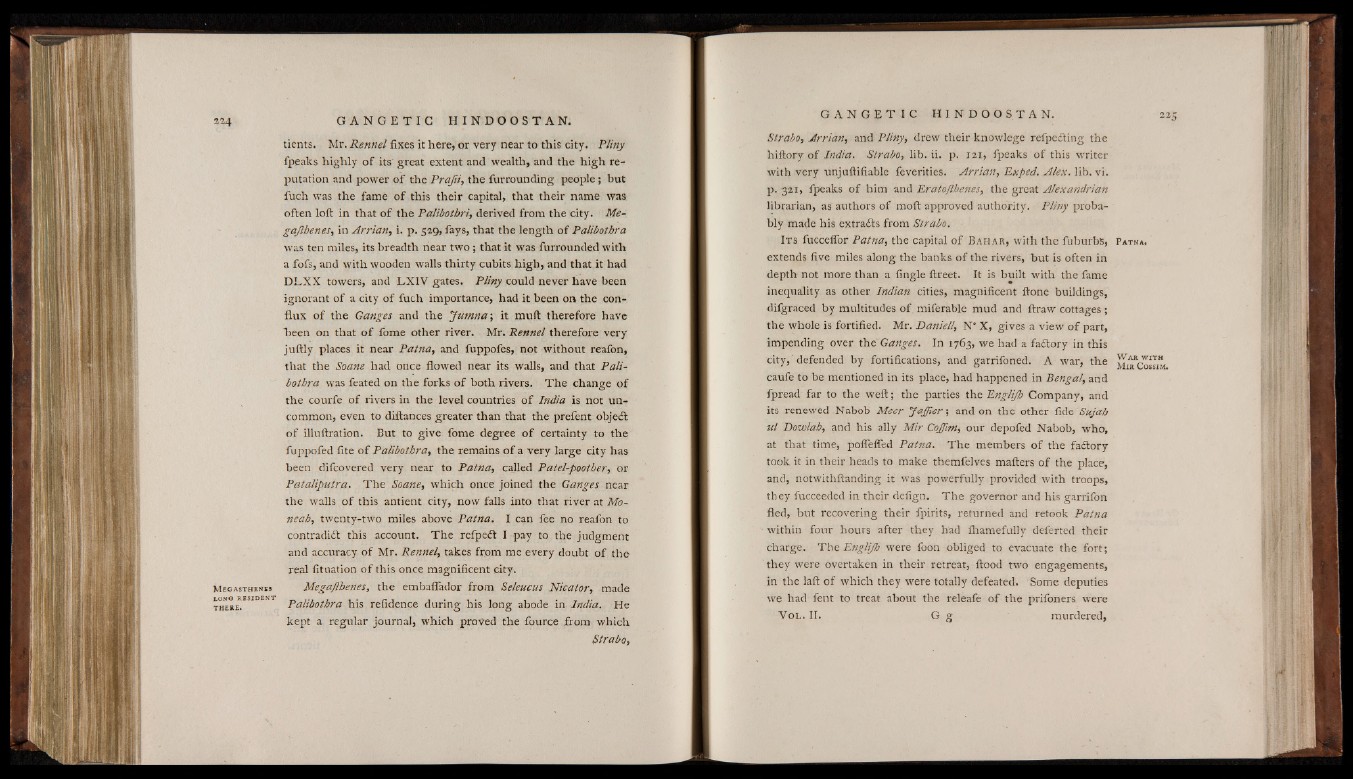
M e g a s t h e n e s
LON a RESIDENT
THERE.
tients. Mr. Rennel fixes it here, or very near to this city. Pliny
fpeaks highly of its great extent and wealth, and the high reputation
and power o f the Praßi, the furrounding people; but
fuch was the fame o f this their capital, that their name was
often loft in that o f the Palibotbri, derived from the city. Me-
gaßbenes, in Arrian, i. p. 529, fays, that the length of Palibotbra
was ten miles, its breadth near two; that it was furrounded with
a fofs, and with wooden walls thirty cubits high, and that it had
DLXX towers, and LXIV gates. Pliny could never have been
ignorant of a city of fuch importance, had it been on the conflux
of the Ganges and the Jumna; it muft therefore have
"been on that o f fome other river. Mr. Rennel therefore very
juftly places it near Patna, and fuppofes, not without reafon,
that the Soane had once flowed near its walls, and that Palibotbra
was feated on the forks of both rivers. The change of
the courfe o f rivers in the level countries of India is not uncommon,
even to diftances greater than that the prefent objedt
of illuftration. But to give fome degree o f certainty to the
fuppofed fite o f Palibotbra, the remains o f a very large city has
been difcovered very near to Patna, called Patel-poother, or
Pataliputra. The Soane, which once joined the Ganges near
the walls of this antient city, now falls into that river at Mo-
neab, twenty-two miles above Patna. I can fee no reafon to
contradict this account. The refpedt I pay to the judgment
and accuracy of Mr. Rennel, takes from me every doubt of the
real fituation of this once magnificent city.
Megaflbenes, the embaflador from Seleucus Nicator, made
Palibotbra his refidence during his long abode in India. He
kept a regular journal, which proved the fource from which
Strabo,
Strabo, Arrian, and Pliny, drew their knowlege refpedting the
hiftory o f India. Strabo, lib. ii. p. 121, fpeaks of this writer
with very unjuftifiable feverities. Arrian, Exped. Alex. lib. vi.
p. 321, fpeaks o f him and Erato/lbenes, the great Alexandrian
librarian, as authors of moft approved authority. Pliny probably
made his extradts from Strabo.
I t s fucceifor Patna, the capital o f B a h a r , with the fuburbs,
extends five miles along the banks of the rivers, but is often in
depth not more than a fingle ftreet. It is built with the fame
inequality as other Indian cities, magnificent ftone buildings,
difgraced by multitudes o f miferable mud and ftraw cottages ;
the whole is fortified. Mr. Daniell, N’ X, gives a view o f part,
impending over the Ganges. In 1763, we had a fadtory in this
city, defended by fortifications, and garrifoned. A war, the
caufe to be mentioned in its place, had happened in Bengal, and
fpread far to the weft; the parties the Englijh Company, and
its renewed Nabob Meer Jaffier; and on the other fide Sujah
u l Dowlah, and his ally Mir Cojjim, our depofed Nabob, who,
at that time, poflefled Patna. The members o f the fadtory
took it in their heads to make tbemfelves mailers o f the place,
and, notwithftanding it was powerfully provided with troops,
they fucceeded in their defign. The governor and his garrifon
fled,- but recovering their fpirits, returned and retook Patna
within four hours after they had ihamefully deferted their
charge. The Engli/b were foon obliged to evacuate the fort;
they were overtaken in their retreat, flood two engagements,
in the laft of which they were totally defeated. Some deputies
we had fent to treat about the releafe of the prifoners were
V o l. II. G g murdered,
P a tn a .
W a r w i t h
M i r C o s s zm .